Jacobs comes to Fordham from Santa Clara University, a Jesuit university in California, where he has served as provost and vice president for academic affairs since 2011. From 2004 to 2011, he was associate provost and vice president for undergraduate studies at the University of Notre Dame. Jacobs will replace Stephen Freedman, Ph.D., who died suddenly on July 2.
“In Dr. Jacobs we have gained an innovative and thoughtful leader, and one who is well prepared to lead the faculty during what promises to be a period of great change in academia,” said Father McShane.
“I am deeply impressed by his experience, intellect, and humanity, and am proud to call him a colleague.”
Jacobs said he was drawn to Fordham because the University understands that liberal arts education is about more than transferring knowledge and honing skills. Rather, he said, Fordham aims to develop persons of character and integrity who aspire to lead ethical lives of meaning and purpose.
“It is an honor and a privilege to be joining the Fordham community. I am excited to help the University adapt and innovate its program offerings, explore mutually beneficial partnerships, and launch strategic initiatives aligned with Fordham’s distinctive Jesuit mission,” Jacobs said.
A native of California, Jacobs earned his Ph.D. in chemistry from Stanford University in 1988, and his bachelor’s degrees in chemistry and physics from the University of California, Irvine, in 1981 and 1982, respectively.
He first joined the University of Notre Dame in 1988 as an assistant professor of chemistry and biochemistry; he became a full professor in 2000. His research focused on reactions relevant to semiconductor processing in the microelectronics industry. Among his most notable projects was a yearlong experiment in 2008 that he designed to take place on the International Space Station. The experiment, which recorded how polymeric materials (plastics) degrade under continuous attack by energetic particles in low Earth orbit, was part of an effort to develop inexpensive, lightweight materials for use in next-generation satellites.
In 2002, Jacobs was named U.S. Professor of the Year for Doctoral and Research Universities by the Council for the Advancement and Support of Education (CASE) and the Carnegie Foundation for the Advancement of Teaching.
At Santa Clara, he has led the university’s strategic planning process; helped secure many major fundraising gifts; assisted faculty in launching the school’s first three online degree programs; and provided leadership throughout the design process of several new academic facilities, including a new STEM complex.
He also created Santa Clara’s Office for Diversity and Inclusion, which supports deans and department chairs in the recruitment of underrepresented faculty and fosters diversity and inclusion in the university’s community and curriculum.
Jacobs’ hiring was the result of an intensive search spearheaded by a 13-member committee that sought input from the University community on who should replace Freedman.
Father McShane also announced that Jonathan Crystal, Ph.D., who assumed the role of interim provost after Freedman’s death, will be promoted to the newly created position of vice provost, the senior member of Jacobs’ staff.
]]>Based on reactions, comments, and shares*, here are the Fordham News stories that were most popular on Facebook this year.
10. Fordham Provost Stephen Freedman Dies at 68
To call an obituary a “popular” post may seem incongruous. The word is very fitting, however, for our late provost Stephen Freedman, who was loved and admired on the Fordham campus and beyond. His untimely death in July shocked the University community; we still grieve for him as we strive to carry on his legacy.
9. Management Course on Spinning Bikes Gets Students Up to Speed
Struggling to fit in your spin workout and still make it to class? Students did both in Julita Haber’s management class, the first ever fitness integrated learning (FIL) class to be offered on an American campus.
8. Faces in the Class of 2018
Hailing from all over the world, these 10 members of the Class of 2018 were just a small sample of the many talented graduates who do us proud each year.
7. Spending a Year With the Jesuit Volunteer Corps
For some Fordham grads—including Charlie Shea and Annie David—the Jesuit Volunteer Corps offers a chance to experience a different community and find a sense of purpose.
6. Performing Arts Programs Earn Top Rankings
Our performing arts programs took center stage this year, earning top spots in several prestigious rankings. Bravo!
5. Fordham Opens New London Centre
Fordham officially unveiled its new London Centre, now located in the Clerkenwell neighborhood and offering study abroad opportunities in liberal arts, business, and drama.
4. Fordham Marches in the St. Patrick’s Day Parade
As always, the Rams had a great showing on Fifth Avenue for the St. Patrick’s Day Parade. We took first place among universities for the third year in a row.
3. Remembering Nicholas Booker
Friends and Fordham staff came together to remember first-year student Nicholas Booker, an athlete, a pal to many, and a promising young man whose future was cut short by a severe asthmatic attack.
2. Moving in on Opening Day
There was plenty of Fordham spirit on display as Opening Day welcomed new and returning students to campus.
1. Sistine Chapel Reproduction Installed at Rose Hill
And our most popular post of 2018 was a recent one: A quarter-scale reproduction of the Sistine Chapel fresco—a gift from the Met—now hangs in Duane Library’s Butler Commons. Be sure to check it out in January, when the University will open the room to members of the campus community.
*A note about our methodology: This list is based on total reactions, comments, and shares, including reactions to other people’s shares– which are not reflected in the numbers seen at the bottom of the posts here.
]]>New York City, on the other hand, has the Metropolitan Opera, world-class museums, and Shakespeare in the Park. And of course, Rockefeller Center, home of the popular show 30 Rock.
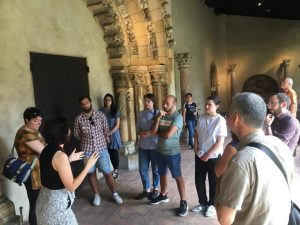
For six Italian exchange students who have been studying at Fordham since August, that’s no small matter. Visits to the Metropolitan Museum of Art have allowed them to take in the ways in which a young country like the United States treats items of antiquity, while living in lower Manhattan has brought pop culture of New York City into sharper focus.
“It’s like living a dream, because we’re very obsessed with American culture. We grew up with American culture, movies, and TV series,” said Marco Cataldi, a native of Calabria, Italy.
“When you experience things in person, its completely different because you can actually feel the realness of something. It can be a little overwhelming.”
Marilena Simeoni, a native of Avezzano, likewise marveled at how the pace of life in New York is dramatically faster, noting that “every day you have something to do, something to see, to visit.”
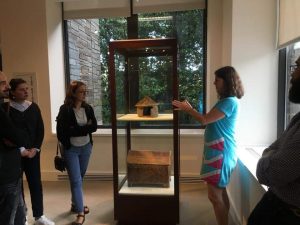
Cataldi, Simeoni and four others studying at Fordham this semester are the inaugural cohort of World Cultural Heritage Studies, a three-year long partnership between Fordham and a consortium of six Italian universities that was signed last year by Fordham president Joseph M. McShane, S.J., and Stephen Freedman, Ph.D., Fordham’s late provost.
Next fall and spring, Fordham graduate students studying the humanities will likewise be invited to study at the Università di Bologna, Università di Chieti-Pescara, Università di Roma La Sapienza, Università di Roma Tor Vergata, Università di Roma Roma Tre, or Università per Stanieri di Perugia.
Education without Borders
Jo Ann Isaak, Ph.D., Fordham’s John L. Marion Chair of Art History and Music, said the goal is to emulate the European Community Action Scheme for the Mobility of University Students program. Since 1987, ERASMUS, as it is commonly known, has essentially eliminated borders for European students.
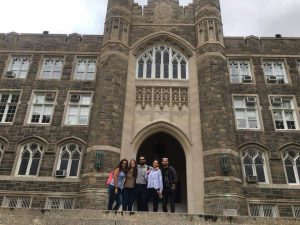
“Every year, students freely come and go to other universities and attend classes and have their classes accredited in their home university. This fluidity is so important,” she said.
“I taught classes in Italian universities, and in my classes, I would have students from all over, not just Italian students. So, it’s very familiar for me, and I can clearly see its advantages for American students. We are a little isolated in America, it is good to see how things are done in another country.”
In addition to Isaak’s class Contemporary Art in Exhibition, the Italian students are taking classes such as Urban Film Video Production by Mark Street,, Ph.D., associate professor of visual arts, and Rewriting the Mediterranean by Francesca Parmeggiani, Ph.D., professor of Italian and comparative literature and Making Early Music by Eric Bianchi, Ph.D., associate professor of music.
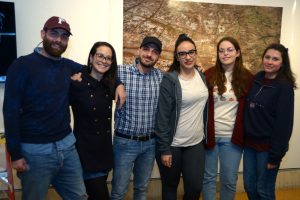
In August, the Italian exchange students along with Fordham graduates were treated to a two-week long immersion course that included trips to major landmarks and sites like Belmont’s Little Italy. Other Fordham students have also taken them on more informal outings, including one to Governor’s Island.
Simeoni said the Cloisters Museum impressed her because the displays there showed a level of attention to medieval objects that is often lacking in Italy. A visit to the African Burial Ground National Monument in lower Manhattan was also particularly moving, she said.
“It was very shocking, seeing it. We study these things in Italy, but it seems far. Here, I can perceive so much, and see how American people try to remember history in the right way,” she said.
“It’s a difficult thing, because telling history is difficult, and it should be done in the most objective way. I saw that here.”
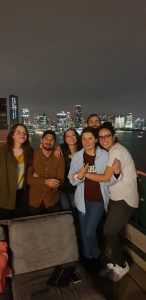
The students in Isaak’s class worked alongside their American counterparts to put on an exhibition as well, Art for Arctic’s Sake, at the Ildiko Butler Gallery on the Lincoln Center campus. At the show’s opening on Nov. 7, students who’d organized the exhibition, the show’s post card, posters, website, and written the catalogue essays, greeted visitors while wearing buttons that said “Ask me about the art.”
Study in Italy
As part of the exchange, Fordham graduate students will have the opportunity to study for a term in Italy. Isaak encouraged students interested in courses such as Everyday Life in Pompeii, Philosophy of Science and Medicine, Novels as Travel Guides, and Magic in the Middle Ages in Italy to consult with their advisors and the dean’s office of the Graduate School of Arts and Sciences.
“The Italian graduate students have been really fantastic to have in my class, and I’ve been happy with the ways our own students have taken on the role of host and introduced them to New York,” Isaak said.
]]>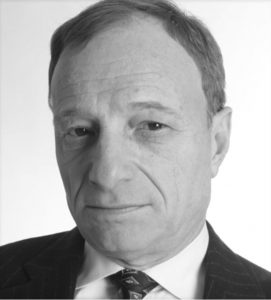
Politics is to Hank Sheinkopf, Ph.D, as air is to the rest of us. Over the course of the last 35 years, Sheinkopf has worked on an estimated 700 political campaigns on four continents, in 15 nations, and in 44 American states.
His clients have included former President Bill Clinton, Leonel Fernandez, the former president of the Dominican Republic; and Vicente Fox, the former president of Mexico. New York City holds a special place in his heart though; he also worked on behalf of former New York City Mayor Michael Bloomberg.
This month, he’s adding another client to his list: Fordham’s Graduate School of Arts and Sciences (GSAS), where he’s teaching a three-session master class titled New York City and Dynamic Change. He’ll also be teaching a full graduate course at Fordham this spring.
Fordham News talked with him recently about his plans for the master class, which was open to all GSAS students and kicked off on Oct. 11.
How did this class come about?
I got an opportunity to meet Stephen Freedman [Fordham’s late provost, who died in July]. We started talking and the next thing I know, he said ‘We would really need to have a longer discussion,’ and I was talking to Dean [Eva] Badowska [dean of the Graduate School of arts and Sciences]. I knew Dr. Freedman because of Tom Dunne [vice president for administration], who has been my friend for 45 years. I immediately felt at home and at ease, and Dr. Freeman felt the same way. And, unfortunately, he passed not long after our meeting. I also know a lot about Fordham from my brother, who is an alumnus, and I like teaching. I’ve had a pretty extraordinary life and career, so I hope that I can give students something that may not get from other people
The topics that you’re going to address in your three sessions are displacement in neighborhood change, demographic change and political/institutional response, and criminal justice after Rikers. How did you pick them?
There’s a sense among many that gentrification is really displacement, and that the redefinition of what this city is is having an adverse impact. I want to explore how we got there, and I want to talk about the solution to the original displacement, which was NYCHA. I will be joined in that discussion by Greg Floyd, the leader of Local 237 Teamsters, who has represented the NYCHA workers. I think he brings a perspective that’s quite different from what the city has to say. I think there is also this sense of powerlessness about how things work that the younger people feel. It seemed important to talk about where that begins, which is housing and the ability to have a decent roof over your head.
The second course made sense after the Alexandria Ocasio-Cortez victory over Joe Crowley. It seems logical that we talk about what those kinds of changes mean, how the institutions of New York City are at risk, and whether it’s a generational shift. Is it a shift of power? Is it a response to the neighborhoods changing?
I picked the Rikers topic because criminal justice reform is a significant discussion that people are having. There has been a lot of material written by authors like Patrick Sharkey at New York University and others on the change of criminal justice, the closing of Rikers, and the rethinking of what role jails and other city facilities and the police should have.
You could teach this course all by yourself. Why are you bringing guest speakers like Floyd, Pulitzer Prize-nominated journalist Tom Robbins, and Judge George Grasso of the Bronx County New York City Criminal Court to class?
I believe you’ve got to take the theoretical and make it practical. We learn theory, but we don’t put it to use. What makes people do the things they do? How do we make this work? Under what conditions? Why is the theory important at all? If you can’t put it to practice, why do you do it?
If there’s any truth about democracy that we need to remember, it’s that it is not a theoretical activity. It requires participation. It requires noise. It requires discussion. And what I am trying to do is explain power in ways that help people understand it. To explain why that which we must cherish is, frankly, under attack, not just in Washington but also at home. The power of the state is being used to redefine what housing should look like, what criminal justice should look like and redefine what institutions should or should not do.
What does this all have to do with “dynamic change?”
Cities by definition are dynamic and moving When they stop moving, they stop being dynamic, and things happen that we really don’t want to see happen. Detroit is an example. When the dynamic moves in the wrong direction, stasis takes over. I think dynamic change is something that cities experience today. I think we need to look at it in a way that’s not threatening. And that we have to manage it in our own lives and in the larger polity, so that we can benefit from it. What’s happening now, in my view, is that we are not benefiting the way that we should. We’re not angry enough about what’s going on around us, and we ought to be.
]]>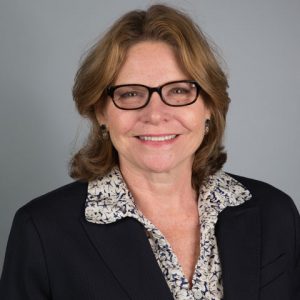
When Stephen Freedman died suddenly in July, he left behind a profound legacy as Fordham’s first provost. Finding someone to succeed him will be a significant task.
Virginia Roach, Ed.D., dean of Fordham’s Graduate School of Education, said the University hopes to honor Freedman’s memory by finding a replacement who can build on his initiatives and chart an ambitious path forward for the University.
Just as Fordham was vastly different when Freedman joined Fordham in 2007 than it is today, so too has the job changed. Roach, who is chairing the committee tasked with searching for a replacement, said that expanding on some of the innovative programs that Freedman spearheaded will be key, but otherwise, the committee is keeping a very open mind as to what sort of candidate could serve Fordham well in an evolving higher-education landscape.
A Search Unencumbered by Borders
Taking its cue from Joseph M. McShane, S.J., president of Fordham, the committee is also very open to input from the Fordham community and beyond, Roach said.
“When Father McShane asked me to chair the search committee, he was adamant that his goal was to have the best provost for Fordham that we can find, even if it’s someone outside of the country if there’s an appropriate match,” she said.
“He certainly has no preconceived notion of who’s going to come, or what they look like, or what background they have. He’s very reliant on the committee to help shape that and to bring forward really strong candidates.”
The process of hiring the University’s new provost—its chief academic officer—kicked off this month on several fronts. A job listing was posted on the University’s website, and the search firm Witt Kieffer was enlisted to recruit potential candidates.
At the same time, a 13-member search committee, chosen by Father McShane after consultations with the Faculty Senate, has begun to solicit feedback from the Fordham community. Roach said the goal of the outreach is to help it settle on parameters to winnow the list of candidates down to a list of semifinalists and finalists. The due date for applications is October 29.
Unvarnished Opinions Welcome
In addition to public forums, the committee has also set up an email account for feedback. The account, [email protected], is overseen by the Witt Kieffer, and feedback is passed along anonymously to the committee. That measure of protection is meant to ensure that the committee gets unvarnished, honest feedback.
“Many people in these forums have given us really great feedback and input, but some people feel more comfortable providing feedback anonymously. We want people to feel like they can say whatever they want to say regarding the search, the email address provides that opportunity,” Roach said.
When it comes to the future provosts’ qualifications, Roach said several aspects of the job are particularly relevant. International endeavors, such as the partnership that Freedman established with the University of Pretoria, will continue to be important, as will exploration of new learning modalities such as online learning. Maintaining Fordham’s reputation as a nationally recognized center for research is key as well.
A One-of-a-Kind Opportunity
Finally, there is the University’s unique tripartite identity.
“Anyone who comes here should know what it means to be a Catholic university, what it means to be a Jesuit university, and what it means to be a university in New York City,” Roach said.
Ultimately, no less than a visionary leader will suffice for the job, she said. The University has an aggressive timetable laid out: the new provost is expected to be announced in January, and to start in September, 2019.
“The reality is, no institution of higher education can stand still. We always have to think about what the challenges are today and tomorrow, and what the profile of a learner is in 2018 and into the future. There are very different ways people acquire information, and very different ways in which people are integrated into the community. All of that is something a provost has to think about, as well as the larger issues, both here in the United States and around the world,” she said.
“We want to hear from the community, and we desperately need people to be aggressive in talking to others they know in the field to encourage recommendations for ideal candidates our search firm can pursue. We’re a complex, sophisticated, nationally ranked institution. I think it’s an attractive challenge.”
]]>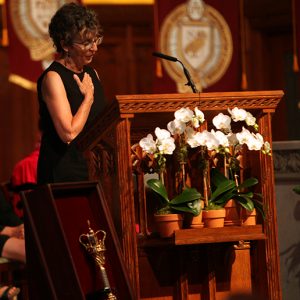
In memorializing Fordham’s late provost, Stephen Freedman, several speakers at a Sept. 6 Service of Remembrance struck parallel themes about their friend, mentor, colleague, husband, and dad, who died suddenly on July 2 at the age of 68.
Joseph M. McShane, S.J., president of Fordham, added to that list of roles, calling Freedman a biologist, polymath, unshakable optimist, Jewish scholar with an Ignatian heart, United Airlines’ best customer, New Yorker by adoption, defender of the poor, champion of liberal arts, Fordham Ram, and “hugger—hugger of donors, hugger of students, hugger of anyone within hugging distance.”
“Stephen was the nearly perfect citizen of the University and of every university that was blessed by his presence in the course of his long career,” said Father McShane. “We were ennobled by his presence, challenged by his dreams, guided by his wisdom, consoled by his love, and enriched beyond measure by his friendship.”
Choosing Life
Eve Keller, Ph.D., president of the Fordham Faculty Senate, said that she had sat across the table from Freedman in boardrooms and restaurants, where he mastered his roles as both mediator and friend.
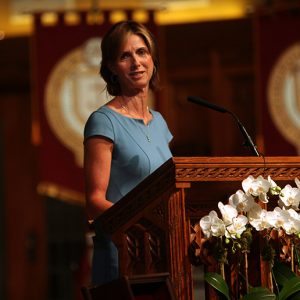
Keller highlighted Freedman’s Jewish faith by quoting a portion of the Torah from Nitzavim, Deuteronomy: “I call heaven and earth to witness against you today, that I have set before you life and death, blessing and curse. Therefore choose life, that you and your offspring may live—so that you may live, you and your seed.”
She noted that rabbinic commentaries typically contextualize the verse as a summing up of preceding texts on rewards and punishments for the Israelites. But Keller chose to focus on particular words in the concluding command: “choose life so you may live.”
“[It] draws my attention away from context and prompts me to read the phrase not as an admonition about obedience, but as an exhortation about choice,” she said. “Choose life, do not merely live it, because to in order to live, in order to really live, you need to actively and consciously engage life in all its pulsing frenetic fullness.”
She then paused to compose herself before continuing.
“Stephen Freedman opted for life,” she said. “Though Lord knows we did our best to beat him up, even at times to beat him down, but Stephen was always on the side of life, always up for another conversation, another hug, another bottle of rather good wine. ‘Tell me about you. Tell me how you are.’”
A Yiddish-Speaking Ignatian
Freedman’s journey from scrawny Yiddish-speaking Canadian to nattily dressed leader at a Jesuit institution was noted by many as point of pride for both him and the University. It was a cross-cultural adventure that was recalled, in part, by Rabbi Eleanor G. Smith, M.D., Freedman’s former rabbi who led the service in the University Church. Smith first met Freedman when she was an aspiring doctor at Loyola University in Chicago and he was dean of Mundelein College there.
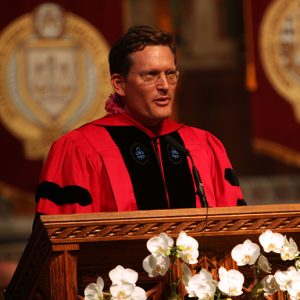
“He introduced me to every single nun on campus,” she said of her friend, who spent four decades of his career at Jesuit universities.
According to John Pelissero, Ph.D., provost emeritus at Loyola Chicago, he made an impression on 99-year-old Sister Jean Dolores Smith, the iconic chaplain for Loyola’s men’s basketball team and assistant dean at the college. On starting his position as dean, he asked her if there were any issues that needed his attention. She gave him a “scouting report,” a piece of paper with 17 issues that needed to be addressed. A year later he returned a crumpled piece of paper with all 17 issues checked off.
“Stephen always respected my good advice,” Sister Jean recently told Pelissero.
Rabbi Smith recalled a trip she took with Freedman to meet a Jesuit M.D. who lived an hour’s drive from Loyola’s campus. Once there, a lunch commenced, with deep discussions on faith and medicine.
“Then we drove an hour back, like that was his job,” she said. “He held my call to medicine with me and lovingly shepherded me through his neck of the woods and is partly responsible for that dream coming to life.”
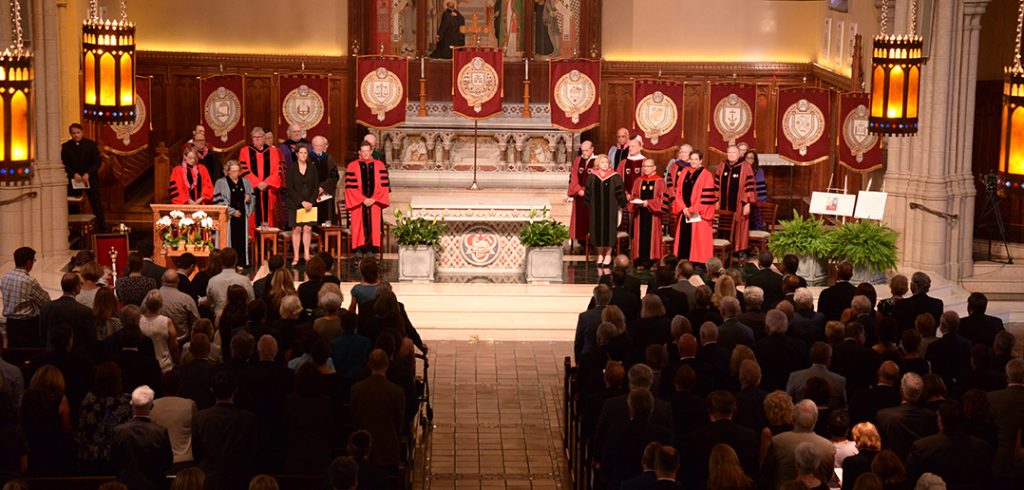
Conversations
“He led by conversation, not by memorandum,” said Eva Badowska, Ph.D., dean of the Graduate School of Arts and Sciences.
She too saw Freedman as a mentor, someone who encouraged her journey to becoming dean not with pep talks, but with probing questions that made her zero in on her goal.
“Are you sure Eva, are you really sure?” he’d ask.
“How this question always undid me,” she said, though she added that it also reassured her. “He didn’t so much care that the next step should be perfectly right; he cared that I should have thought about it. He wanted, as he said, ‘to see fire in the belly,’ but he had no patience for unquestioned self-confidence or unanalyzed certainty.”
Badowska spoke of a University photo of Freedman on the steps of Keating presiding over commencement ceremonies. In the photo, a smidge of pink material could be seen between a crisp shirt collar and his blue academic robes. It was a Hawaiian lei, she said.
“What was this Jewish provost at a Jesuit Catholic university doing wearing a lei under his academic regalia?” she asked. “And he said, ‘This is to remind me this is a happy day.’”
He loved the pomp and circumstance of academic life, she said, but needed to remind himself of the joy of the occasion. Accordingly, many of the deans and dignitaries on the altar at the service wore leis too. She said Freedman always dreamed about relaxing on a Hawaiian beach, though in truth, the notion was very much out of character.
“He was just about the last person who could sit quietly on a beach relaxing with fruity tropical drinks—and anyway he was into red wine,” she said.
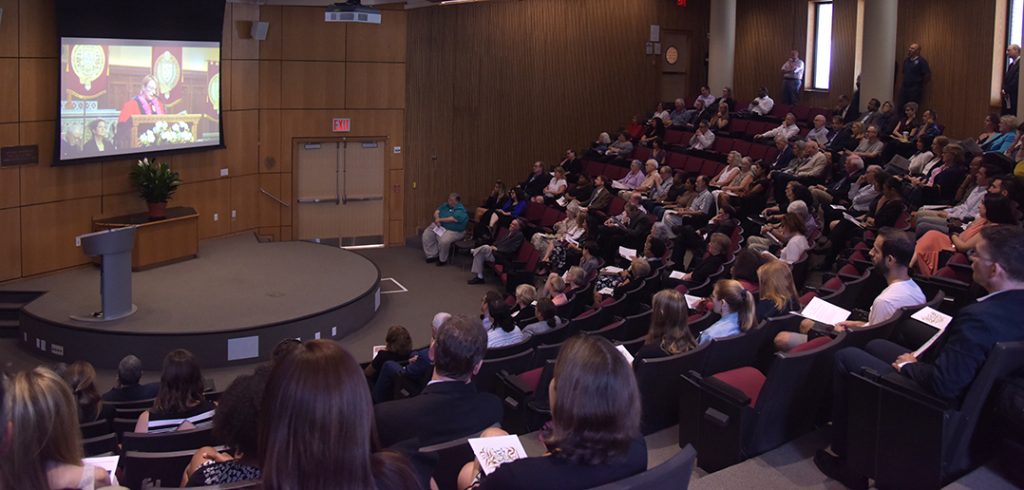
Restless Spirit
Indeed, Freedman’s son, Zachary Freedman, Ph.D., assistant professor of plant science at West Virginia University, recalled physically active rather than restful family vacations. On ski trips, he and his father were the first on the slopes when the lifts opened, skiing up and down the mountain all day until the lifts stopped running, “when it felt like your legs were going to fall off.”
“Lunch breaks were for the weak,” said Zachary.
Zachary said his father was a “first-generation college student, an immigrant, an outsider, and an American success story.” He was born April 7, 1950, to Sam and Sylvia Freedman of Montreal, Quebec. Freedman’s own father was an orphan-turned-Golden Glove boxer and his mother was the daughter of Polish immigrants. His first language was Yiddish.
The family owned a gas station and repair shop where they put in very long hours. Freedman started pumping gas when he was 13. Zachary said this was where his father developed his work ethic.
Freedman met his wife, Eileen Shore, at Loyola College in Montreal (now Concordia University), where they were both biology majors. The two became “best friends for 50 years and married for 44,” Zachary said. He said that his father often said that his most joyous days were when Zachary and his brother Noah were born. His darkest day was when his mother, “his center of gravity,” died suddenly at the age of 60.
“The journey of grieving his mom’s death solidified in him a sense that our time on earth is finite and too short, and that life is precious and should be experienced and enjoyed to the fullest extent,” said Zachary.
“He did all the things great dads do, red light green light, duck duck goose,” he said. There were basketball games, and “super fun days” that once included trips to Chucky Cheese’s and WWF and eventually evolved into adult golf outings and Cubs games. And then there was the final “super fun week” in Beijing, China, where Zachary and Noah joined their dad on a work trip, where he was laying the groundwork for Fordham’s international strategy.
“He was so proud to show us around that ancient city that he had gotten to know and love over the years,” he said.
“If there’s any comfort to be sought in my dad’s premature death, it’s that he most definitely lived life to the fullest, he gave it everything that he had,” he said. “In doing so, my dad naturally and effortlessly embodied several Jesuit values: cura personalis, care of the whole person; women and men for others, my dad was always ready and eager to help another.
“But I would argue most of all my dad embodied magis, or simply more, striving for better, striving for excellence, no matter what.”
Preceding the service, members of the Freedman family and several members of the Board of Trustees dedicated the Freedman Conference Room at Cunniffe House. Below is the memorial plaque.
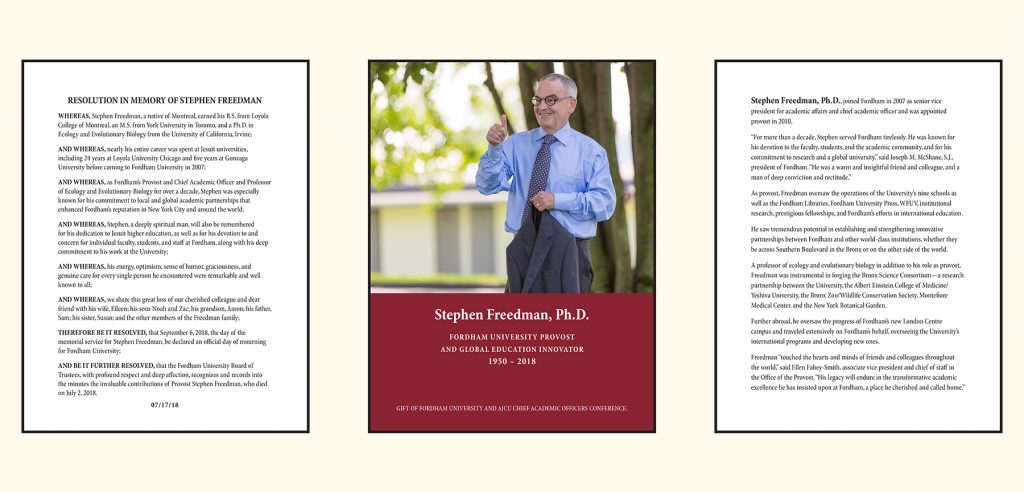
]]>
This past May, Fordham took a big step toward embracing this new world, as 14 members of the faculty and administration traveled to Sophia University in Japan as part of the first Fordham Faculty Research Abroad program.
The delegation, which was led by Fordham’s provost, the late Stephen M. Freedman, Ph.D., hailed from fields as varied as political science, economics, biological sciences, education, social service, and art history. The theme of the trip was comparative urban studies.
George Hong, Ph.D., chief research officer and associate vice president for academic affairs, said the trip was the result of Fordham’s Continuous University Strategic Planning (CUSP) process, which the University began in 2015.
In the CUSP process, four areas were given high priority: Interdisciplinary research, sponsored research, global research, and faculty-student research collaborations. This trip fulfilled all of those priorities by bringing Fordham researchers into contact with peers in Japan who are pursuing research on many topics within that field. It also established an exchange program for faculty and students between the two schools.
Collaborating on Food Justice
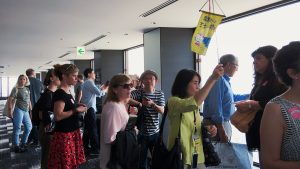
One of those connections was between Garrett Broad, Ph.D., assistant professor of Communication and Media Studies and James Farrer, Ph.D., a professor of sociology and global studies at Sophia University. Farrer has been researching food entrepreneurship in Tokyo and the role that small vendors play in local economies, a topic of interest to Broad, who penned More Than Just Food: Food Justice and Community Change (University of California Press, 2016).
“We’re talking about setting up a workshop here in New York at some point next year where we bring together a group of scholars who are exploring issues related to food, society, globalization and local food economies,” Broad said.
“The hope for this enterprise is it’s not a one off, where we had this nice trip to Tokyo, made some friends and that’s that. We want to continue and build some partnerships, and since there’s only so much you can do in just a few days, a workshop is a way we can keep the momentum going.”
Broad also took the opportunity to visit and interview scientists at a Tokyo organization that is experimenting with “cellular agriculture.” The technology, which Broad had already been researching for an upcoming project, involves growing meat in a laboratory, negating the need to slaughter animals. To help him overcome language and cultural barriers, he recruited Sophia University undergraduate students to accompany him.
Making Personal Connections in the Field
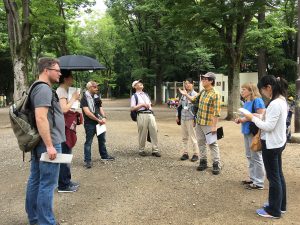
Annika Hinze, Ph.D., assistant professor of political science and director of Fordham’s urban studies program, came away from the trip deeply affected by potential collaborations. While one group from Fordham was given a tour related to sustainability and environmental issues, she attended a tour centered on social issues that was led by Nanako Inaba, a professor in Sophia’s department of global studies.
Of particular interest to Hinze was a public park that had recently been partially sold to private interests, including Nike. A sizable homeless population still calls the park home, and Hinze interviewed one of them to get a sense of how his presence was actually a form of protest.
“I’m a field researcher first and foremost, and in order to understand places, it’s vital to actually visit them and get to know them a little bit. The initial connections you make with people can be the jumping point for creating meaningful research partnerships,” she said.
“The walking tours were amazing, because they were done by people who are academics who are researching social or sustainability issues and who really know the environment.”
Global Partnerships Critical to Funded Research
Connections such as these are crucial to solving challenges, Hong said. They’re also often a prerequisite for researchers who wants to get their projects funded by some external sources.
“More and more American foundations are requiring global partnership as precondition for applications. If you don’t have an international partner, you are out,” he said.
On that front, the trip was also a success, as Fordham faculty identified 27 researchers in Japan who are ready to collaborate on joint grant proposals, research projects, and research papers. Hong and his team also identified more than 40 funding opportunities to support these research projects. Several faculty members are working on joint proposals, he said, and one has already submitted one. He expects that there will be opportunities for Fordham students to assist in future studies as well.
Hong noted that a byproduct of Fordham faculty traveling together was also an increase in collaborations amongst themselves. Next summer, a group of them will travel to Europe, where the theme will be “digital scholarship.”
“They immediately picked up some ideas and learned from each other. It was the same subject, urban studies, but different disciplines, education, social service, the sciences, history, social sciences, humanities, natural science,” he said.
In addition to prearranged meetings, there were serendipitous meetings at Sophia University as well. Takehiro Watanabe, Ph.D., an associate professor of anthropology at Sophia whose research touches on participatory community environmental processes, led the Fordham contingent on a tour of a river revitalization project and chaired a panel discussion that Broad participated in.
“Afterward, he saw some things in my presentation that connected to some of the subjects that he’s interested in, such as participatory science and citizen science,” Broad said.
“The more time you’re able to spend, and the more people you’re able to meet, you realize you have more in common.”
]]>Freedman joined Fordham in 2007 as senior vice president for academic affairs and chief academic officer. He was appointed provost in 2010.
“For more than a decade, Stephen served Fordham tirelessly. He was known for his devotion to the faculty, students, and the academic community, and for his commitment to research and a global university,” said Joseph M. McShane, S.J., president of Fordham.
“He was a warm and insightful friend and colleague, and a man of deep conviction and rectitude. Stephen’s death is a grievous loss not just for his family and Fordham friends, but for everyone who knew him. We will miss him terribly.”
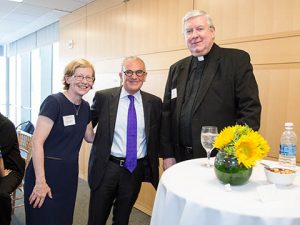
As provost, Freedman oversaw the operations of the University’s nine schools as well as the Fordham Libraries, Fordham University Press, WFUV, institutional research, prestigious fellowships, and Fordham’s efforts in international education.
Pioneering Partnerships at Home and Abroad
Freedman saw tremendous potential in establishing and strengthening partnerships between Fordham and other world-class institutions, whether they be across Southern Boulevard in the Bronx or across the Atlantic in London.
A professor of ecology and evolutionary biology in addition to his role as provost, Freedman was instrumental in forging the Bronx Science Consortium—a research partnership between the University, the Albert Einstein College of Medicine/Yeshiva University, the Bronx Zoo/Wildlife Conservation Society, Montefiore Medical Center, and the New York Botanical Garden. The consortium offered numerous hands-on opportunities for undergraduate and graduate students to collaborate with some of the top researchers in the world.
Further abroad, he oversaw the progress of Fordham’s new London Centre campus, set to open this fall. In December 2017, when the University signed the lease on the new space, Freedman noted the many possibilities for scholarship beyond the traditional semester abroad.
“London will not merely be a campus for Fordham students to study away,” he said, “but a destination for students from other universities across Europe and Asia, and a hub of global scholarship. London, and our programs in Beijing and Pretoria, are templates for expanding the Fordham mission outside of New York City, and outside of the United States.”
Freedman traveled extensively on Fordham’s behalf, overseeing the University’s international programs—and developing new ones. In May, he led the first Fordham Faculty Research Abroad Program at Sophia University in Tokyo. That same month, he celebrated the 20th anniversary of Fordham’s Beijing International MBA (BiMBA) program in China.
International Strategy
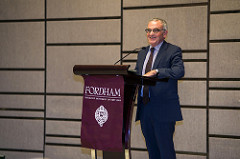
“He would often say that one of the responsibilities that the board gave him when he became provost was to develop an international strategy for Fordham, and so he took that seriously,” said Jonathan Crystal, Ph.D., interim vice president and chief academic officer in the Office of the Provost.
“He was incredibly innovative in establishing partnerships, online learning … he was a visionary. He was not stuck in the traditional ways of thinking about higher ed. He was really committed to making Fordham a global institution,” said Crystal. “He also put a lot of importance in his mentoring of me and other administrators and faculty at Fordham. … He was just incredibly selfless. He had so much heart.”
Ellen Fahey-Smith, associate vice president and chief of staff in the Office of the Provost, said Freedman “touched the hearts and minds of friends and colleagues throughout the world.”
“His legacy will endure in the transformative academic excellence he has insisted upon at Fordham, a place he cherished and called home,” said Fahey-Smith, who worked with Freedman for more than 10 years. “I will miss him deeply.”
‘A Deeply Spiritual Man’
Freedman worked closely with his faculty colleagues to develop new ideas and initiatives at home as well as abroad.
“He was very committed to the faculty,” said Magda Teter, Ph.D., the Shvidler Chair in Judaic Studies and professor of history at Fordham. “Once a faculty member too, he understood our work and the challenges we face. He was very strongly supportive and extremely warm,” she said through tears.
Teter said Freedman was “one of the key figures” in the development of Fordham’s Jewish Studies program, which Teter directs. She also said he was extremely proud to be the Jewish provost of a Jesuit university.
“He would always bring it up as a mark of pride in Fordham. He felt it spoke volumes about Fordham and its ethos of inclusion,” she said.
“He was a deeply spiritual man. When we were in Jerusalem together in 2016, it was a deeply moving experience for him, even though it was not his first time,” she said. “That’s why it worked for him to be a provost at Fordham—that commitment to faith.”
When he joined the Fordham faculty in 2007, Freedman told FORDHAM magazine that he’s “always seen science and religion as complementary.”
“My own scientific and religious backgrounds have enhanced each other, and I think informed discussions between theologians and scientists play a critical role in the shaping of ideas,” he said.
A native of Montreal, Freedman earned a B.S. from Loyola of Montreal, an M.S. in environmental studies from York University in Toronto, and a Ph.D. in ecology and evolutionary biology from the University of California at Irvine. He also completed the United Nations Graduate Study Program in Geneva.
He has spent nearly his entire career at Jesuit Universities; for 24 years he was at Loyola University of Chicago, where he taught biology and served as dean of Mundelein College. From 2002 until 2007, he was academic vice president at Gonzaga University in Spokane, Washington.
Freedman is survived by his wife, Eileen; his sons, Zac and Noah; and his grandson Aaron. Fordham will hold a memorial service to honor him in the fall.
Feature photo by Chris Taggart
]]>It is with profound sorrow that I write to tell you that Dr. Stephen Freedman, beloved Provost of the University, died suddenly at his home in Hastings on Hudson last evening.
It is hard to overstate what a shocking and terrible loss this is to Stephen’s wife, Eileen; his sons, Zac and Noah; his grandson Aaron; and his friends and colleagues here at Fordham and in the academic community.
For more than a decade, Stephen has served Fordham tirelessly. He was known for his devotion to the faculty, students, and the academic community, and for his commitment to research and a global university. He was a warm and insightful friend and colleague, and a man of deep conviction and rectitude. Stephen’s death is a grievous loss not just for his family and Fordham friends, but for everyone who knew him. We will miss him terribly.
I have asked Dr. Jonathan Crystal to serve as interim vice president and chief academic officer. We will form a search committee in the following weeks.
We will share information on services for Stephen as soon as they are available. In the interim, I know you join me in keeping his family and loved ones in your thoughts and prayers.
Sincerely,
Joseph M. McShane, S.J.
Soler was one of a select group of students who attended the distinguished meeting. Stephen Freedman, Ph.D., provost of Fordham University, was a speaker at the summit and served on a panel about global citizenship.
]]>In a ceremony at the Lincoln Center campus on Sept. 27, Ambassador William Lacy Swing, director general for the U.N.’s International Organization for Migration (IOM), and Joseph M. McShane, S.J. president of Fordham, signed a memorandum of understanding linking the two institutions together.
The formal partnership with the IOM, the leading nongovernmental organization for migration, follows a similar partnering between Fordham’s Institute of International Humanitarian Affairs (IIHA) and the International Federation of Red Cross and Red Crescent Societies (IFRC).
Swing said the IOM, which has 10,000 members stationed in 480 spots around the globe, was eager to partner with an academic institution to work on projects involving data and statistics, joint publications, and lectures. The organization has worked informally with the IIHA for the past 19 years, and sent numerous members to its workshops, making the partnership a natural fit.
“In one of the worlds’ great migration cities, Fordham University has very much become a center for the study of migration and humanitarian work in general, which we’re very grateful for,” Swing said.
“I think the possibility for expansion is very large.”
IIHA Executive Director Brendan Cahill said he was thrilled to work closely with IOM because the group is run in a very cost effective way, and delivers aid effectively, ethically, and humanly.
“Their focus is on migration, but that can come in many different forms, from protection to resettlement to negotiations, and they do it by having 97 percent of their employees in field positions and only three percent in the office,” he said.
“We want someone who has a real boots on the ground approach. Whether we work on publications, research, training, or analysis, we bring not only the strengths of the institute, but also the wealth of the knowledge that exists in the faculty at Fordham, together with the IOM and their focus on migration.”
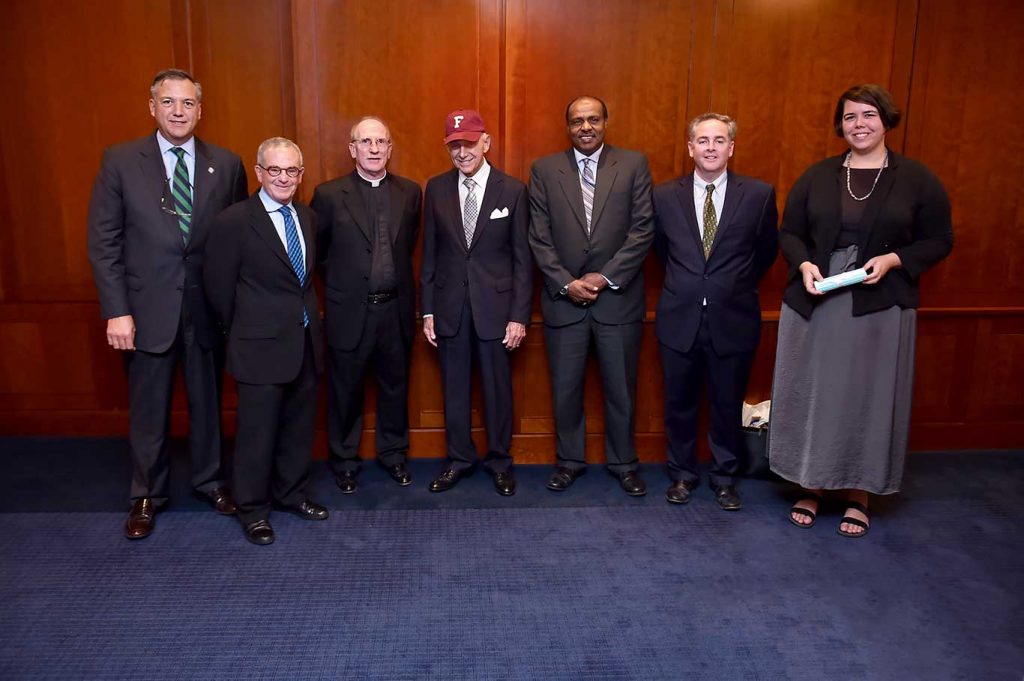
Photo by Dana Maxson